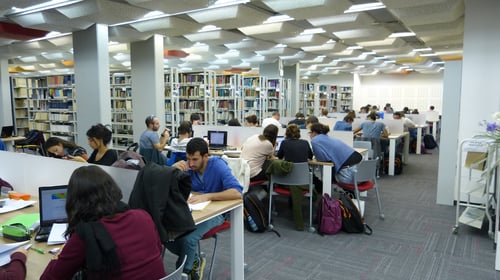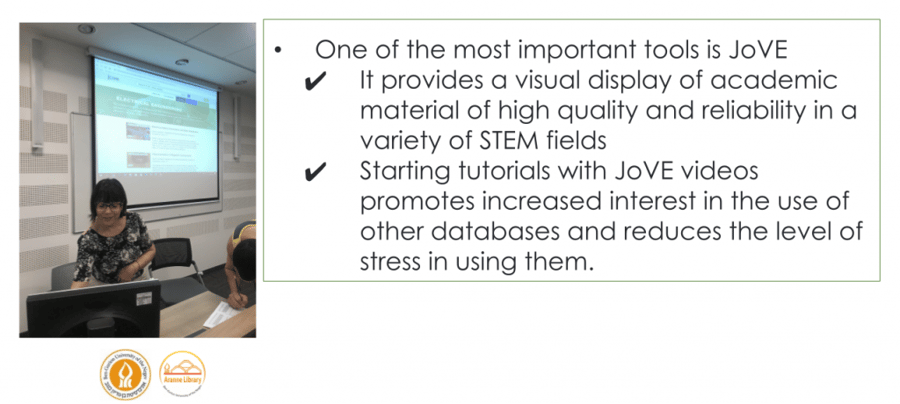With over 20,000 students and 1,000 faculty members, Ben-Gurion University of the Negev is one of the leading research and teaching universities in Israel. The Aranne Central Library is an intellectual hub for visitors from across the Negev, and is always buzzing with activity — students, researchers and instructors from different departments frequently visit the library to access its vast collections of databases, journal subscriptions, audiovisual material, recorded lectures, maps and more.
For the library team, providing information in a format that suits users’ needs is critical. “Today, students and researchers are accustomed to locating information quickly,” says Dorit van Moppes, STEM Librarian. “In the spirit of continuous and rapid change, the library must adapt the wealth of information it provides for use by the new generation of students.”
To provide its users with a convenient access point to the library’s resources, the library team has developed a set of department-specific tutorials that help students locate databases and use search tools best suited to their subject of study. For the university’s science departments, a key component of this toolkit is JoVE, and the library has made dedicated efforts to ensure the best use of JoVE resources by its users.
Implementing JoVE with the support of the library
The library team has worked closely with natural sciences and engineering faculty to help them embed JoVE into their courses, with excellent results. “The importance of JoVE during COVID-19 pandemic and the new remote learning methods is significant, and contributes a lot for managing the labs in these challenging times,” says van Moppes.
According to the team, JoVE resources have helped to:
— Address the challenges of undergraduate lab work: Conducting experiments and writing reports has proven to be challenging for many undergraduate students, especially in their first year. To enhance the lab experience, many instructors use JoVE as their tool of choice for students' initial exposure to laboratory protocols and safety procedures. “The videos help students succeed in all tasks related to performing the lab,” notes van Moppes.
— Present key information in different formats: JoVE videos clearly explain key concepts through visualizations and provide step-by-step demonstrations of experiments. They are also accompanied by written explanations, and are often available in different languages. This helps improve the quality of students’ understanding of important foundational material.
— Reduce anxiety about conducting independent research: The team found that using JoVE videos at the beginning of a tutorial not only promoted students' interest in the tutorial, but also made students less anxious about carrying out research using JoVE and other databases.

The university’s science faculty attest to the value of JoVE in their classrooms.
“We use JoVE videos in our Cell Biology course labs,” says Dr. Barak Rotblat, Senior Lecturer and researcher at the Center for Evolutionary Genomics and Medicine. “We have 4 labs and for each one we uploaded JoVE videos that explain concepts and basic techniques. These videos accompany the lab videos that we have filmed”.
“The videos are very clear,” says Professor Michele Zaccai from the Department of Life Sciences, “I will continue to use them in courses and labs.”
For Ms. Hila Cohen, Co-ordinator of the Laboratory of General Chemistry, JoVE is a key tool. “To adapt new experiments, I look through the database for the accepted methods used for teaching, to suit students in the course I lead,” she says.
The team notes that JoVE videos demonstrating experimental research studies have also been useful to graduate students and research assistants at the university, whether for staying up-to-date on the latest scientific literature, conducting laboratory work or writing articles.
Promoting inter-departmental collaboration in partnership with JoVE
The Aranne Central Library emphasizes the importance of cultivating close ties between the library and different academic departments, to help users better understand the kinds of assistance the library can offer. To this end, the library team has collaborated with JoVE to extend support to faculty and scientists at the institution in a variety of ways:
— Syllabus mapping: Members of the JoVE customer success team have worked closely with faculty to locate the videos best suited to their course syllabi.
— Training sessions: Accompanied by JoVE representatives, the library conducted a training session for lab engineers. A walkthrough of the JoVE video library was presented, as well as different options for locating lab methods. The team notes that the training was attended by over 20 lab engineers and the feedback to the tool and its capabilities was very positive.

— JoVE webinars: When the institution shifted to remote learning, the library, in collaboration with JoVE, held a webinar for all researchers in the Department of Life Sciences. In the webinar, they presented JoVE and the possibilities for its use as a learning tool. The ability to embed JoVE into learning management systems formed a key part of the webinar and training sessions. “The ability to embed JoVE videos into Moodle allows for optimal synchronization with the material learned during the lectures,” van Moppes says.
Thus, the close collaboration between the Aranne Central Library team and JoVE at the Ben-Gurion University of the Negev has proven to be a fruitful one. The incorporation of JoVE resources into science courses and research, notes van Moppes, “has exemplified a success story for the incorporation of a database into the academic curriculum when the library supports the implementation process and leads it.”

